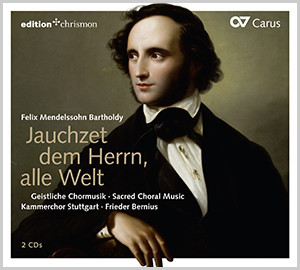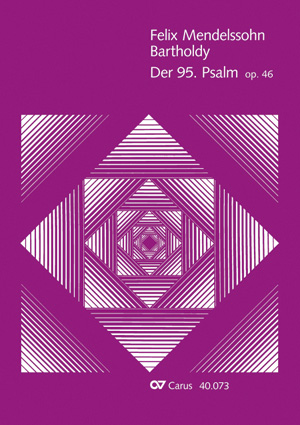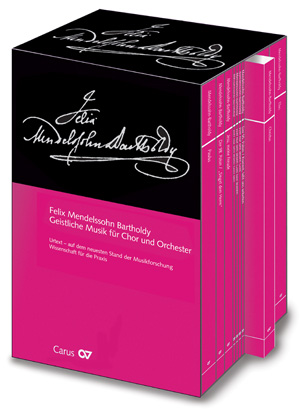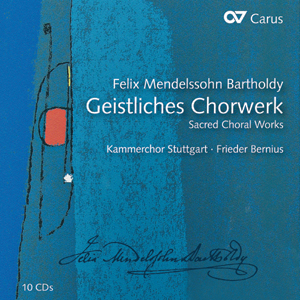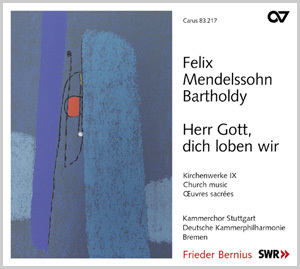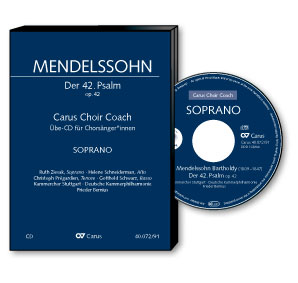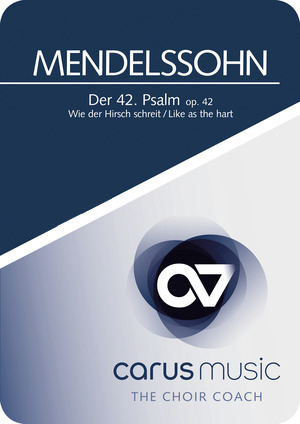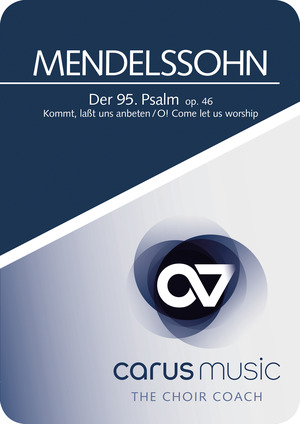
Psalm texts inspired Mendelssohn throughout his life, and as well as unaccompanied pieces, he wrote five major orchestral psalm settings. Their new kind of form, somewhere between that of a Bach cantata and the oratorios of Handel, became highly regarded in the 19th century. Psalm 95 begins with a joyful exhortation to worship the Lord, but then turns into a warning against disobeying God’s word. Mendelssohn develops this contrast strongly in the music: the first part is characterized by solemnity. In the second section the musical language is more fragile and intimate, the phrases are longer and, if the choir follows the conductor closely, the tutti in the final chorus can have a flowing character in some passages, and sometimes a pressing and dramatic character elsewhere.
Performers: Andrea L. Brown (soprano), Maria Bernius (soprano), Monica Groop (alto), Werner Güra (tenore), Michael Volle (basso) – Kammerchor Stuttgart, Deutsche Kammerphilharmonie Bremen – Frieder Bernius
Simply practice. Anytime. Everywhere.
Whether at home on your tablet or PC or on the road on your smartphone: with carus music, the Choir Coach, you always have your choral works with you to practice! With the carus music choir app, you can listen to your score together with a first-class recording on any device and easily practice your own choir part with a coach. With carus music, your concert preparation is easy, efficient and fun to master!
Performers: Andrea L. Brown (soprano), Maria Bernius (soprano), Monica Groop (alto), Werner Güra (tenore), Michael Volle (basso) – Kammerchor Stuttgart, Deutsche Kammerphilharmonie Bremen – Frieder Bernius
Purchase
Additional product information
Contents
-
Composer
Felix Mendelssohn Bartholdy
| 1809-1847
-
Choir
Kammerchor Stuttgart
The Kammerchor Stuttgart is regarded as one of the best ensembles of its kind. Over its fifty-year existence, Frieder Bernius has developed the choir into an exceptional ensemble acclaimed by audiences and press alike. This has led to invitations for the choir to perform at all the important European festivals. In Germany the chamber choir performs at festivals and in concert halls in repertoire ranging from the 17th to the 21st century. Frieder Bernius and his ensemble have received numerous accolades for their contribution to new music. The Kammerchor Stuttgart has made over 80 CDs and LPs, numerous of which have been awarded international recording prizes (including the Edison award, Diapason d’or, Gramophone Choice, Classical Internet Award, International Classical Music Award, and German Record Critics’ Award prizes). The International Federation for Choral Music has invited the ensemble to sing at the 1st, 4th and 10th World Symposia on Choral Music in Vienna, Sydney and Seoul. Regular tours of North America and Asia since 1988 and a South America tour reflect the Kammerchor Stuttgart’s international reputation. Since 1984 the top ensemble has also been invited to Israel biennially. Personal details
-
Ensemble
Die Deutsche Kammerphilharmonie Bremen
The Deutsche Kammerphilharmonie Bremen is one of the world's leading orchestras, captivating audiences everywhere with its unique style of music-making. The Estonian conductor Paavo Järvi has been the orchestra's Artistic Director since 2004.
One of the many highlights of the collaboration with Paavo Järvi has been their Beethoven Project, on which conductor and orchestra concentrated for six years. Their Beethoven interpretations have been acclaimed worldwide by audiences and critics alike as benchmark performances. Following the Beethoven Project The Deutsche Kammerphilharmonie Bremen and Paavo Järvi focused on Robert Schumann's symphonic works with equal success.
The latest project of the orchestra and its conductor is the German composer Johannes Brahms. The first CD (Sony/RCA) of the project – Symphony No. 2, Tragic Ouverture and the Academic Festi-val Ouverture – was released in autumn 2017 and received the Opus Klassik in October 2018. The second CD, including Symphony No. 1 and the Haydn-Variations, followed in autumn 2018. With the third and fourth Symphony, released in March 2019, the symphony cycle has come to completion.
Highlight of the project was the internationally acclaimed performance of ›A German Requiem‹ on the 10th of April 2018 at Bremen Cathedral, 150 years after the first performance. The recording has now been released on DVD and Blu-ray by C-Major. In October 2019, ›The Brahms Code‹ – an excit-ing TV/DVD documentary about the Brahms Project produced by Deutsche Welle/Unitel – was re-leased and is the current German Record Critics' Award winner in the category music film (listed 1/20).
The Deutsche Kammerphilharmonie Bremen has been honoured with countless prizes such as Echo, Opus and Diapason d'Or for its recordings and the unique education project with the Gesamtschule Bremen-Ost in Osterholz-Tenever, the Zukunftslabor. For years, the orchestra has cultivated close musical friendships with international soloists such as Christian Tetzlaff, Maria João Pires, Janine Jansen, Igor Levit, Hilary Hahn and Martin Grubinger.
The Deutsche Kammerphilharmonie Bremen is permanent guest orchestra at the Elbphilharmonie Hamburg and Festival Orchestra of Kissinger Sommer. Personal details
-
Conductor
Frieder Bernius
| 1947Frieder Bernius’s work has earned great worldwide recognition. He is in demand internationally as a conductor and as a teacher. His principal artistic collaborators are the ensembles he founded himself, the Kammerchor Stuttgart, the Barockorchester Stuttgart, the Hofkapelle Stuttgart and the Klassische Philharmonie Stuttgart. As a guest conductor, he has collaborated repeatedly with, for example, the SWR Vokalensemble Stuttgart, the Deutsche Kammerphilharmonie Bremen, the Stuttgarter Kammerorchester and the Streicherakademie Bozen. Great stylistic versatility is Frieder Bernius’s hallmark. Whether he conducts vocal works by Monteverdi, Bach, Händel, Mozart, Beethoven, Fauré and Ligeti, stage music by Mendelssohn or symphonies by Haydn, Burgmüller and Schubert, his work always aims for a sound that is at once unmistakably personal and at the same time oriented towards the original period sound ideal. He devotes himself equally to the rediscovery of 18th century operas and to first performances of contemporary compositions. He is particularly interested in the musical history of southwestern Germany. Carus-Verlag has awarded Frieder Bernius a Golden CD for his complete recording of the sacred music of Felix Mendelssohn Bartholdy. The award was presented to him during the German Choir Festival in Stuttgart 2016. The sale of over 250,000 recordings, which has been acclaimed with a number of awards, has made a not insignificant contribution to what today is the obvious presence of Mendelssohn's complete œuvre in the concert repertoire. Personal details
-
Soloist - soprano
Maria Bernius
-
Soloist - soprano
Andrea Lauren Brown
Whether Baroque or contemporary music, Lieder or opera, the soprano Andrea Lauren Brown is equally convincing through the brilliant lightness of her interpretations. She made her operatic debut at the age of seventeen in Libby Larsen’s A Wrinkle in Time. This was followed by studies at West Chester University, Pennsylvania, Westminster Choir College in Princeton, New Jersey and at the Mozarteum in Salzburg. Winner of numerous prizes, in Europe she has given guest performances at the Theater an der Wien, the Festspielhaus Baden-Baden, at the Schwetzingen and Ludwigsburg Festivals, Spoleto Festival and Schumann Festival in Düsseldorf. Personal details
-
Soloist - mezzo-soprano
Monica Groop
-
Soloist - tenor
Werner Güra
Werner Güra studied at the Salzburg Mozarteum. He continued his vocal training with Kurt Widmer in Basle and Margreet Honig in Amsterdam. He has appeared as a guest singer in operas in Frankfurt, Basle, Dresden, Paris and Brussels, and has sung regularly at the Staatsoper in Berlin since 1999. As a concert and oratorio singer he frequently appears with leading orchestras and renowned conductors. He has made a number of tours to Japan. Werner Güra also has a reputation as a Lied interpreter, which is reflected in concerts for international promoters and in his numerous recordings, which have won prestigious awards like the “Diapason d’Or.” Personal details
-
Soloist - bass
Michael Volle
Frequent questions about this work
 There are no questions and answers available so far or you were unable to find an answer to your specific question about this work? Then click here and send your specific questions to our Customer Services!
There are no questions and answers available so far or you were unable to find an answer to your specific question about this work? Then click here and send your specific questions to our Customer Services!


